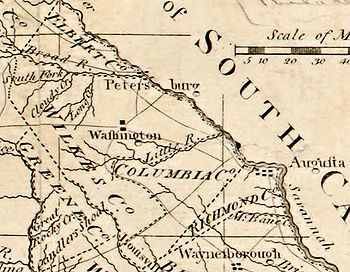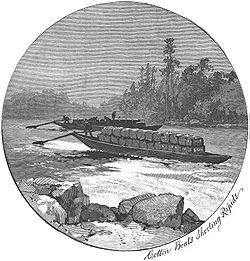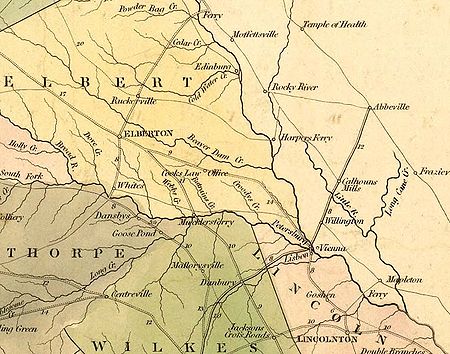
Petersburg, Georgia
Encyclopedia

Wilkes County, Georgia
Wilkes County is a county located in the U.S. state of Georgia. As of 2000, the population was 10,687. The 2007 Census estimate shows a population of 10,262. The county seat is the city of Washington. Referred to as "Washington-Wilkes", the county seat and county are commonly treated as a...
(now Elbert
Elbert County, Georgia
Elbert County is a county located in the U.S. state of Georgia. It was established on December 10, 1790 and was named for Samuel Elbert. As of 2000, the population was 20,511. The 2007 Census Estimate shows a population of 20,525...
) County. Named after Petersburg, Virginia
Petersburg, Virginia
Petersburg is an independent city in Virginia, United States located on the Appomattox River and south of the state capital city of Richmond. The city's population was 32,420 as of 2010, predominantly of African-American ethnicity...
, it was founded by Dionysius Oliver in 1786 to serve the rapidly growing Broad River Valley
Broad River (Georgia)
The Broad River is a tributary of the Savannah River in northeastern Georgia. The North Fork of the Broad River begins in the foothills of the Appalachian Mountains in Stephens County, then joins the Middle Fork west of Royston in Franklin County to form the main stem. The Broad River continues...
region of Georgia (Coulter 1965:32), and enjoyed connection via pole boat with Augusta, Georgia
Augusta, Georgia
Augusta is a consolidated city in the U.S. state of Georgia, located along the Savannah River. As of the 2010 census, the Augusta–Richmond County population was 195,844 not counting the unconsolidated cities of Hephzibah and Blythe.Augusta is the principal city of the Augusta-Richmond County...
via the Savannah River
Savannah River
The Savannah River is a major river in the southeastern United States, forming most of the border between the states of South Carolina and Georgia. Two tributaries of the Savannah, the Tugaloo River and the Chattooga River, form the northernmost part of the border...
(Coulter 1965:49). Petersburg gained importance as a tobacco
Tobacco
Tobacco is an agricultural product processed from the leaves of plants in the genus Nicotiana. It can be consumed, used as a pesticide and, in the form of nicotine tartrate, used in some medicines...
inspection, vital to local planters in obtaining good prices for their casked produce. During the peak of its prosperity, from 1800 to 1810, it was the third largest city in Georgia after Savannah and Augusta (Jones Jr. 1878:VI)
Longstreet described the town in connection with an annual exhibition at Moses Waddel's nearby Willington Academy
Moses Waddel
Moses Waddel was an American educator and minister in antebellum Georgia and South Carolina. Famous as a teacher during his life, Moses Waddel was author of the bestselling book Memoirs of the Life of Miss Caroline Elizabeth Smelt.- Life and work:Born in 1770 in Rowan County, North Carolina,...
. 'Petersburg was quite an active, busy, commercial little town. It was situated in the fork of the Savannah and Broad Rivers, and contained some eight or ten stores, with the usual supplement of grog shops, and the very unusual supplement of a billiard-table. Notwithstanding these last, the citizens of the place were generally remarkable for their refinement, respectability, intelligence and hospitality. The dwelling houses far outnumbered the stores and shops. It was separated from Lisbon by Broad River, and from Vienna by the Savannah. Lisbon we believe could never boast of more than two stores and a groggery, and as many dwellings. Vienna surpassed Lisbon in everything, but exactly how far, and in what we are not able to say, except in John Glover's house and store, which had no match in Lisbon.' (Longstreet 1864:129)
Notable persons from the Broad River Valley area included William Wyatt Bibb
William Wyatt Bibb
William Wyatt Bibb was a United States Senator from Georgia and the first Governor of the U.S. state of Alabama. Bibb County, Alabama, and Bibb County, Georgia, are named for him....
, who practiced medicine in Petersburg, and became a U. S. Representative from Georgia. He went on to serve in the U.S. Senate 1813-1816, moved to Alabama as the Territorial Governor, and in 1819 was elected as the first Governor of that state (Coulter 1965:41-44). Charles Tait
Charles Tait
Charles Tait was an American politician. A Democratic Republican, he served as a United States Senator from Georgia and later as a United States federal judge.-Early life:...
was brought with his family to the area in 1783 and served in the U.S. Senate 1809-1818, making Petersburg the home of concurrent Senators (Coulter 1965:44-45). George Rockingham Gilmer
George Rockingham Gilmer
George Rockingham Gilmer was an American statesman and politician. He served two non-consecutive terms as the 34th Governor of Georgia, the first from 1829 to 1831 and the second from 1837 to 1839...
, born in Wilkes County and a pupil of Waddel's Academy, was U. S. Representative in the 1820's and Governor of Georgia 1829-1831 and 1837-1839.

Cotton
Cotton is a soft, fluffy staple fiber that grows in a boll, or protective capsule, around the seeds of cotton plants of the genus Gossypium. The fiber is almost pure cellulose. The botanical purpose of cotton fiber is to aid in seed dispersal....
, which was 'thrown upon boats all along the river without being inspected' (Sherwood 1837:215). Other reasons given were the advent of steam boats (which were not practicable above Augusta), and later, the rivers worked against the construction of railroads essential for economic life after 1850. But above all the opportunity of fresh land to the west powerfully attracted its inhabitants (Coulter 1965:167-173). The Petersburg post office moved to nearby Lisbon, Georgia in 1844, and closed in 1855 (Krakow 1999:174-175). Vienna, South Carolina also disappeared.
The town is best remembered today for its 'Petersburg boats', a pole boat of ten tons carrying capacity well suited for the stretch of river between Petersburg and Augusta, and in common use until well after the War (Coulter 1965:63-64).
Geography
Petersburg was located at 33°57'48"N, 82°34'13"W (WGS84/NAD83), at the confluence of the BroadBroad River (Georgia)
The Broad River is a tributary of the Savannah River in northeastern Georgia. The North Fork of the Broad River begins in the foothills of the Appalachian Mountains in Stephens County, then joins the Middle Fork west of Royston in Franklin County to form the main stem. The Broad River continues...
and Savannah
Savannah River
The Savannah River is a major river in the southeastern United States, forming most of the border between the states of South Carolina and Georgia. Two tributaries of the Savannah, the Tugaloo River and the Chattooga River, form the northernmost part of the border...
Rivers, 75 river miles above Augusta
Augusta, Georgia
Augusta is a consolidated city in the U.S. state of Georgia, located along the Savannah River. As of the 2010 census, the Augusta–Richmond County population was 195,844 not counting the unconsolidated cities of Hephzibah and Blythe.Augusta is the principal city of the Augusta-Richmond County...
, and 305 river miles above Savannah
Savannah, Georgia
Savannah is the largest city and the county seat of Chatham County, in the U.S. state of Georgia. Established in 1733, the city of Savannah was the colonial capital of the Province of Georgia and later the first state capital of Georgia. Today Savannah is an industrial center and an important...
. The 86 lots first laid out by Oliver occupied an area of about 40 acres (Coulter 1965:34). Population as reported by the U.S. Census of 1810 was 332, including slaves, and earlier may have numbered twice as many (Coulter 1965:73).
The site is now mostly submerged by Clarks Hill Lake
Lake Strom Thurmond
Lake Strom Thurmond, known in Georgia as Clarks Hill Lake, is a reservoir at the border between Georgia and South Carolina in the Savannah River Basin. It was created by the J. Strom Thurmond Dam during 1951 and 1952 by the U.S. Army Corps of Engineers near the confluence of the "Little River" and...
, but visitors to Bobby Brown State Park
Bobby Brown State Park
Bobby Brown State Outdoor Recreation Area is a 665 acre Georgia state park located near Chennault and Middleton. The park's name is a memorial to Robert T. Brown, a lieutenant in the U.S. Navy who was killed during World War II...
can see foundations during low water. Maritime historians and archaeologists conducted a multidisciplinary investigation on the submerged ruins of the town in 1988 (Elliott 1988 and 1995).
External links


